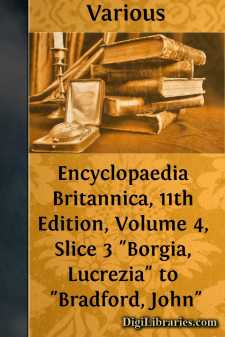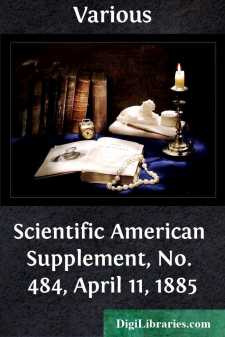Categories
- Antiques & Collectibles 13
- Architecture 36
- Art 48
- Bibles 22
- Biography & Autobiography 813
- Body, Mind & Spirit 142
- Business & Economics 28
- Children's Books 14
- Children's Fiction 11
- Computers 4
- Cooking 94
- Crafts & Hobbies 4
- Drama 346
- Education 46
- Family & Relationships 57
- Fiction 11828
- Games 19
- Gardening 17
- Health & Fitness 34
- History 1377
- House & Home 1
- Humor 147
- Juvenile Fiction 1873
- Juvenile Nonfiction 202
- Language Arts & Disciplines 88
- Law 16
- Literary Collections 686
- Literary Criticism 179
- Mathematics 13
- Medical 41
- Music 40
- Nature 179
- Non-Classifiable 1768
- Performing Arts 7
- Periodicals 1453
- Philosophy 64
- Photography 2
- Poetry 896
- Political Science 203
- Psychology 42
- Reference 154
- Religion 513
- Science 126
- Self-Help 84
- Social Science 81
- Sports & Recreation 34
- Study Aids 3
- Technology & Engineering 59
- Transportation 23
- Travel 463
- True Crime 29
Encyclopaedia Britannica, 11th Edition, Volume 4, Slice 3 "Borgia, Lucrezia" to "Bradford, John"
by: Various
Publisher:
DigiLibraries.com
ISBN:
N/A
Language:
English
Published:
1 year ago
Downloads:
14
Categories:
*You are licensed to use downloaded books strictly for personal use. Duplication of the material is prohibited unless you have received explicit permission from the author or publisher. You may not plagiarize, redistribute, translate, host on other websites, or sell the downloaded content.
Description:
Excerpt
BORGIA, LUCREZIA(1480-1519), duchess of Ferrara, daughter of Cardinal Rodrigo Borgia, afterwards Pope Alexander VI. (q.v.), by his mistress Vanozza dei Cattanei, was born at Rome in 1480. Her early years were spent at her mother’s house near her father’s splendid palace; but later she was given over to the care of Adriana de Mila, a relation of Cardinal Borgia and mother-in-law of Giulia Farnese, another of his mistresses. Lucrezia was educated according to the usual curriculum of Renaissance ladies of rank, and was taught languages, music, embroidery, painting, &c.; she was famed for her beauty and charm, but the corrupt court of Rome in which she was brought up was not conducive to a good moral education. Her father at first contemplated a Spanish marriage for her, and at the age of eleven she was betrothed to Don Cherubin de Centelles, a Spanish nobleman. But the engagement was broken off almost immediately, and Lucrezia was married by proxy to another Spaniard, Don Gasparo de Procida, son of the count of Aversa. On the death of Innocent VIII. (1492), Cardinal Borgia was elected pope as Alexander VI., and, contemplating a yet more ambitious marriage for his daughter, he annulled the union with Procida; in February 1493 Lucrezia was betrothed to Giovanni Sforza, lord of Pesaro, with whose family Alexander was now in close alliance. The wedding was celebrated in June; but when the pope’s policy changed and he became friendly to the kingof Naples, the enemy of the house of Sforza, he planned the subjugation of the vassal lords of Romagna, and Giovanni, feeling his position insecure, left Rome for Pesaro with his wife. By Christmas 1495 they were back in Rome; the pope had all his children around him, and celebrated the carnival with a series of magnificent festivities. But he decided that he had done with Sforza, and annulled the marriage on the ground of the husband’s impotence (March 1497). In order to cement his alliance with Naples, he married Lucrezia to Alphonso of Aragon, duke of Bisceglie, a handsome youth of eighteen, related to the Neapolitan king. But he too realized the fickleness of the Borgias’ favour when Alexander backed up Louis XII. of France in the latter’s schemes for the conquest of Naples. Bisceglie fled from Rome, fearing for his life, and the pope sent Lucrezia to receive the homage of the city of Spoleto as governor. On her return to Rome in 1499, her husband, who really loved her, was induced to join her once more. A year later he was murdered by the order of her brother Cesare. After the death of Bisceglie, Lucrezia retired to Nepi, and then returned to Rome, where she acted for a time as regent during Alexander’s absence. The latter now was anxious for a union between his daughter and Alphonso, son and heir to Ercole d’Este, duke of Ferrara. The negotiations were somewhat difficult, as neither Alphonso nor his father was anxious for a connexion with the house of Borgia, and Lucrezia’s own reputation was not unblemished....











